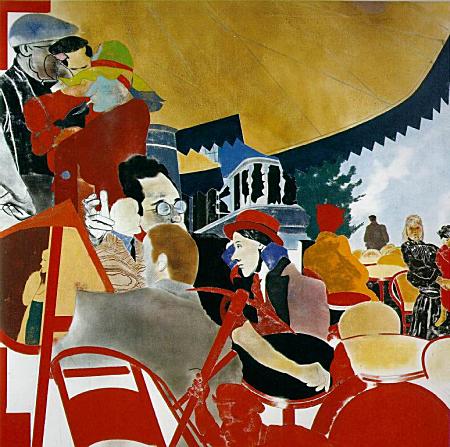R.B. Kitaj 1932-2007

The Autumn in Paris (after Walter Benjamin) 1972-73
It is, fittingly for our late century, a work shot through with oppositions that Kitaj is able to indicate but never quite resolve satisfactorily, which is as it should be: “Reducing complexity is a ruse.” (one is reminded of Scriabin’s exhortations to the young Boris Pasternak, cited in Pasternak’s memoir, Safe Conduct, to simplify art as much as possible – this from a master of some of the most disturbingly complex music ever written: simplicity is the ideal, complexity is the reality.) First there is Kitaj’s situation as a wanderer and expatriate, freighted with memories and attitudes from the homeland in which he had no wish to reside permanently, yet not entirely understood or accepted in his adopted country, eager as it is to welcome artistic refugees from America. As a displaced person, he was well qualified to serve as spokesman for our century.
As it happens, Kitaj did return to live in the country of his birth, these United States, after a show in London that was heavily criticized by English art critics, so nastily in fact, that Kitaj blamed the critics for having caused the aneurysm from which his second wife, the painter Sandra Fisher died at the age of 46.

 Poasis II: Selected Poems 2000-2024
Poasis II: Selected Poems 2000-2024 “Todesguge/Deathfugue”
“Todesguge/Deathfugue” “Interglacial Narrows (Poems 1915-2021)”
“Interglacial Narrows (Poems 1915-2021)” “Always the Many, Never the One: Conversations In-between, with Florent Toniello”
“Always the Many, Never the One: Conversations In-between, with Florent Toniello” “Conversations in the Pyrenees”
“Conversations in the Pyrenees” “A Voice Full of Cities: The Collected Essays of Robert Kelly.” Edited by Pierre Joris & Peter Cockelbergh
“A Voice Full of Cities: The Collected Essays of Robert Kelly.” Edited by Pierre Joris & Peter Cockelbergh “An American Suite” (Poems) —Inpatient Press
“An American Suite” (Poems) —Inpatient Press “Arabia (not so) Deserta” : Essays on Maghrebi & Mashreqi Writing & Culture
“Arabia (not so) Deserta” : Essays on Maghrebi & Mashreqi Writing & Culture “Barzakh” (Poems 2000-2012)
“Barzakh” (Poems 2000-2012) “Fox-trails, -tales & -trots”
“Fox-trails, -tales & -trots” “The Agony of I.B.” — A play. Editions PHI & TNL 2016
“The Agony of I.B.” — A play. Editions PHI & TNL 2016 “The Book of U / Le livre des cormorans”
“The Book of U / Le livre des cormorans” “Memory Rose Into Threshold Speech: The Collected Earlier Poetry of Paul Celan”
“Memory Rose Into Threshold Speech: The Collected Earlier Poetry of Paul Celan” “Paul Celan, Microliths They Are, Little Stones”
“Paul Celan, Microliths They Are, Little Stones” “Paul Celan: Breathturn into Timestead-The Collected Later Poetry.” Translated & with commentary by Pierre Joris. Farrar, Straus & Giroux
“Paul Celan: Breathturn into Timestead-The Collected Later Poetry.” Translated & with commentary by Pierre Joris. Farrar, Straus & Giroux